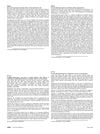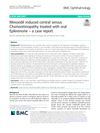 4 citations,
August 2018 in “Facial Plastic Surgery Clinics of North America”
4 citations,
August 2018 in “Facial Plastic Surgery Clinics of North America” Platelet-Rich Plasma (PRP), a protein-rich extract from a patient's blood, shows promise in improving hair density, thickness, and quality, but the best method of use and number of treatments needed for noticeable results are still unclear.
 January 2024 in “Journal of Cosmetic Dermatology”
January 2024 in “Journal of Cosmetic Dermatology” Platelet-rich plasma may improve hair density and count in male pattern hair loss, but more high-quality research is needed.
 January 2018 in “General internal medicine and clinical innovations”
January 2018 in “General internal medicine and clinical innovations” Busulfan/cyclophosphamide and total bone irradiation are equally effective for AML transplants.
 April 2017 in “Journal of Investigative Dermatology”
April 2017 in “Journal of Investigative Dermatology” Blocking JAK-STAT5 signaling in mice leads to hair growth.
 March 2014 in “Journal of The American Academy of Dermatology”
March 2014 in “Journal of The American Academy of Dermatology” Mycophenolic acid may help hair grow by activating pathways important for hair growth.
September 2022 in “Journal of The American Academy of Dermatology” More research is needed to understand how skin type affects laser treatment for hair loss.
 198 citations,
July 2011 in “Cochrane library”
198 citations,
July 2011 in “Cochrane library” Lifestyle changes can improve body composition, excess male hormone levels, and insulin resistance in women with PCOS.
 162 citations,
August 2004 in “Journal of Investigative Dermatology”
162 citations,
August 2004 in “Journal of Investigative Dermatology” Hair loss causes stress and affects mental health; treatment and support needed.
 159 citations,
September 2001 in “European Journal of Cancer Care”
159 citations,
September 2001 in “European Journal of Cancer Care” Chemotherapy-induced hair loss significantly affects patients' well-being, and nurses are key in helping them cope, but more research is needed to find effective treatments.
 125 citations,
January 1999 in “Drugs”
125 citations,
January 1999 in “Drugs” Finasteride effectively treats baldness but may cause sexual side effects.
 101 citations,
March 1987 in “Journal of The American Academy of Dermatology”
101 citations,
March 1987 in “Journal of The American Academy of Dermatology” Minoxidil solution helps hair regrowth in alopecia areata, with 5% being more effective.
 81 citations,
May 2007 in “Fertility and Sterility”
81 citations,
May 2007 in “Fertility and Sterility” Testosterone therapy seems safe for postmenopausal women for a few years, but more research is needed for long-term effects.
 75 citations,
January 1997 in “Journal of ethnopharmacology”
75 citations,
January 1997 in “Journal of ethnopharmacology” Santolina chamaecyparissus oil effectively fights fungal infections.
69 citations,
May 2009 in “Journal of Investigative Dermatology” Stress might contribute to hair loss in alopecia areata.
 40 citations,
May 1987 in “The Lancet”
40 citations,
May 1987 in “The Lancet” Minoxidil helps some bald men, but most lose hair again when stopping.
32 citations,
July 2016 in “PubMed” 5-alpha reductase inhibitors are generally safe but can cause sexual side effects and require patient education on risks.
 30 citations,
May 1991 in “Psychosomatics”
30 citations,
May 1991 in “Psychosomatics” Some psychiatric medications can cause reversible hair loss.
 24 citations,
November 2018 in “International Journal of Molecular Sciences”
24 citations,
November 2018 in “International Journal of Molecular Sciences” Ethosomes improve drug delivery through the skin but may have side effects like irritation.
 23 citations,
April 1999 in “Dermatologic Clinics”
23 citations,
April 1999 in “Dermatologic Clinics” Pulsed-intense light can significantly reduce hair, with effectiveness depending on treatment number and timing, and has mild side effects.
 19 citations,
October 2018 in “PLOS ONE”
19 citations,
October 2018 in “PLOS ONE” 5 alpha-reductase inhibitors can slightly improve symptoms of enlarged prostate but have a high risk of sexual side effects.
18 citations,
August 2019 in “Clinical breast cancer” Local hormonal treatment for vulvovaginal atrophy is likely safe for women with estrogen receptor-positive breast cancer on aromatase inhibitors.
 15 citations,
March 2013 in “Pharmaceutical nanotechnology”
15 citations,
March 2013 in “Pharmaceutical nanotechnology” Finasteride delivery through skin improved using invasomes and iontophoresis.
 13 citations,
December 2017 in “Archives of Medical Sciences”
13 citations,
December 2017 in “Archives of Medical Sciences” Rivaroxaban can cause liver injury, allergic reactions, blood vessel inflammation, and hair loss, but these side effects are rare.
 11 citations,
July 2008 in “European Journal of Drug Metabolism and Pharmacokinetics”
11 citations,
July 2008 in “European Journal of Drug Metabolism and Pharmacokinetics” Finasteride helps reduce pain and inflammation in animals.
 11 citations,
June 1996 in “Nutrition”
11 citations,
June 1996 in “Nutrition” Vitamin D3 may prevent hair loss from chemotherapy, but side effects and cancer cell protection are concerns.
 7 citations,
November 1987 in “Pharmacotherapy: The Journal of Human Pharmacology and Drug Therapy”
7 citations,
November 1987 in “Pharmacotherapy: The Journal of Human Pharmacology and Drug Therapy” Minoxidil can help thicken hair in some people with male pattern baldness, especially if used early and continuously.
 4 citations,
April 2021 in “Journal of Cosmetic Dermatology”
4 citations,
April 2021 in “Journal of Cosmetic Dermatology” Botulinum toxin may help hair loss by increasing blood flow and reducing harmful factors.
 4 citations,
June 2020 in “BMC Ophthalmology”
4 citations,
June 2020 in “BMC Ophthalmology” Minoxidil can cause a rare eye condition, but it was successfully treated with oral Eplerenone in one case.
3 citations,
May 2023 in “Journal of the American Academy of Dermatology” Certain drugs can cause hair loss, but stopping the drug usually leads to hair regrowth.
 3 citations,
June 2011 in “Korean Journal of Clinical Oncology”
3 citations,
June 2011 in “Korean Journal of Clinical Oncology” The document concluded that there were no effective ways to prevent hair loss from chemotherapy but treatments were being explored.
























